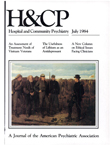Restrictiveness of Care Among the Severely Mentally Disabled
Abstract
Restrictiveness of care was assessed among 286 severely mentally disabled individuals known to an urban community mental health center. By examining dinical records, the authors rated each subject for each month during a period of up to 85 months on four dimensions of restrictiveness: physical freedom, time constraints, legal status, and conservatorship. The maximum restrictiveness experienced by most of the subjects was high, reflecting periodic involuntary hospitalization. The average restrictiveness they experienced, however, was well below the level represented by state hospital care. Thus the authors suggest that the average restrictiveness experienced by this population has been reduced since the initiation of deinstitutionalization.
Access content
To read the fulltext, please use one of the options below to sign in or purchase access.- Personal login
- Institutional Login
- Sign in via OpenAthens
- Register for access
-
Please login/register if you wish to pair your device and check access availability.
Not a subscriber?
PsychiatryOnline subscription options offer access to the DSM-5 library, books, journals, CME, and patient resources. This all-in-one virtual library provides psychiatrists and mental health professionals with key resources for diagnosis, treatment, research, and professional development.
Need more help? PsychiatryOnline Customer Service may be reached by emailing [email protected] or by calling 800-368-5777 (in the U.S.) or 703-907-7322 (outside the U.S.).



